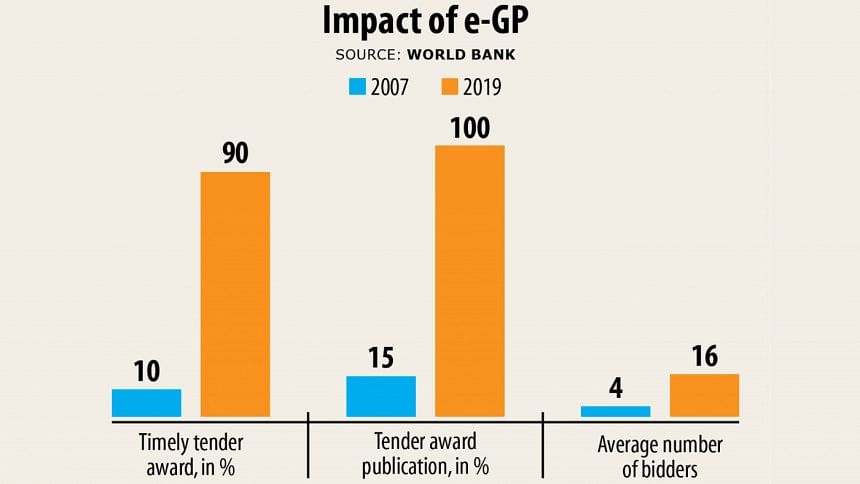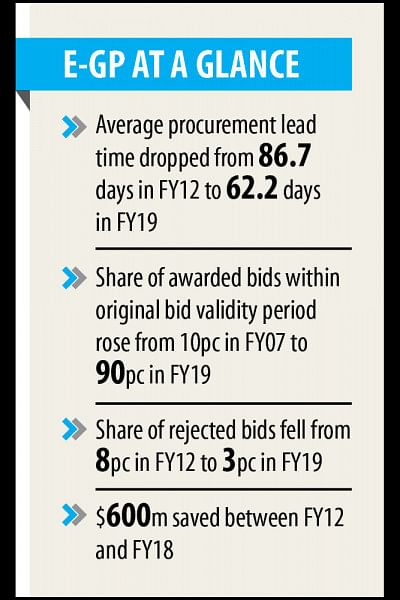Huge potential lies in electronic procurement

Despite some loopholes, the implementation of an electronic system for public procurement, replacing paper-based lengthy process, has been a boon for Bangladesh as it is saving millions of dollars and reducing time in the bidding process, the World Bank said.
Because of the Electronic Government Procurement (e-GP), an estimated $600 million has been saved between fiscal year 2012 and FY2018, the development lender said in its latest assessment on the public procurement system in Bangladesh.
Average procurement time from the invitation of bidding to contract signing declined from 93 days to 59 days in case of open tendering method works from FY2011 to FY2019, according to the report titled "Assessment of Bangladesh Public Procurement System".
After the introduction of e-GP in 2011, the bidding environment has improved significantly compared to the paper-based tendering system. Market access has also increased.
Only 10 per cent of tenders were awarded on time in 2007. It jumped to 90 per cent in 2019. Only 15 per cent tenders award publication took place in 2007 and it was 100 per cent in 2019, the WB said.
On average, only four bidders participated in bidding in 2007. It rose to 16 in 2019.
The report is based on information of 296,760 e-GP and 12,000 traditional paper-based purchases by the government between FY12 and FY19.
Besides, it incorporated interviews and focus group discussions with key implementing agencies and surveys of bidders conducted in five districts.
In FY20, government purchase was estimated at around $24.1 billion, which was 45.2 per cent of the annual budget and 8 per cent of the GDP. In FY2019, e-GP processed 62 per cent of $24 billion in public procurement expenditure.
"Therefore, any improvement in the public procurement system is likely to have a significant financial effect," said the WB.
According to the assessment, 80 per cent of government procurement was made through the open competitive method.
Before the introduction of e-GP, bidders from a geographical area generally participated in the procurement process only within that area. However, e-GP has changed the scenario with a significant increase of non-local winners, the WB said.
The share of rejected bids declined from 8 per cent in FY2012 to 3 per cent in FY2019.
Currently, there are 1,365 procuring agencies in the country. As of July, 1,343 agencies registered with the e-GP system. The number of tenderers registered with e-GP stood at 74,395, the Central Procurement Technical Unit (CPTU), which introduced e-GP, said in July.
The Planning Commission officials said that if the e-GP system were implemented more effectively, the amount of savings made could have been much more than $600 million.
They made the comments as the World Bank report also said bidders need to give bribes in the form of financial benefits, arrange trips and host dinners for government officials to win contracts.

A 2017 study by Wahid Abdallah, then a research fellow at the Brac Institute of Governance and Development, showed that the e-GP holds enormous potential benefits for the country. Each Tk 1 spent on such efforts will do a phenomenal Tk 663 of good, the study found.
The global lender highlighted the progress in the government procurement process.
The country has a robust public procurement system in place. This includes a procurement law, secondary legislation and associated standard bidding documentation and a well-functioning nodal agency CPTU, said the assessment.
The CPTU provides round-the-clock help desk service to address questions and problems raised by bidders and the public, including the media.
The e-GP portal, www.eprocure.gov.bd, covers the end-to-end procurement process starting from procurement planning to authorisation of payment to the contractors or suppliers. The module up to contract award is fully operational now.
The WB pointed out challenges as well.
The public purchase process lacks transparency and some sections in the Public Procurement Act limit scope for competition among bidders. Large bidders are monopolising the procurement market, leaving the small ones marginalised, it said.
About delayed implementation of contracts, the WB proposed rolling out the newly developed electronic contract management (e-CMS) system module of the e-GP and monitoring contract management performance.
It called for creating a supplier database with unique identification of bidders and their beneficial owners and tracking the performance of the suppliers or contractors, including specialised groups.
The WB said a policy document with a detailed implementation road map for sustainable procurement should be prepared.
It proposed connecting e-GP with the integrated budget and accounting system (iBAS++) to facilitate real-time capturing of budget utilisation, procurement commitment and procurement expenditure and monitoring and tracking of payment.
A centralised procurement body at the central or regional level should be set up to procure commonly required items, the assessment paper said.
Other recommendations include scaling up citizen monitoring of contract implementation and including legal provision for a mandatory market analysis for high value and complex procurements before initiating the procurement process to better understand the market composition, qualification of the bidders and specifications of the product.
The total value of the tenders is Tk 410,000 crore, the CPTU said in July.
The number of tenders invited online in Bangladesh has gone past four lakh in an indication of the country's race towards digitalisation.


 For all latest news, follow The Daily Star's Google News channel.
For all latest news, follow The Daily Star's Google News channel. 



Comments